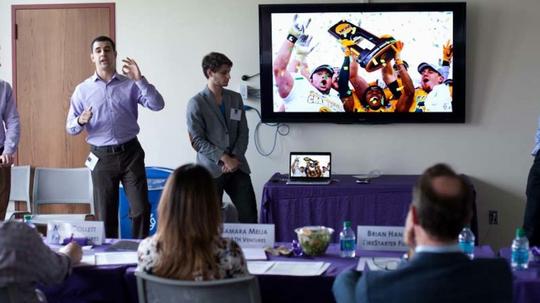
Major Division I football programs spend between $400,000 and $580,000 on recruiting 20 to 25 new players every year, and that cost is growing: A USA Today Sports analysis from last year showed that from the 2008-09 season to the 2012-13 season, spending on football recruiting increased by more than $8.9 million--about 30 percent--among Division 1A public schools.
Recruiting the right players can be extremely lucrative for universities, but recruiting is tricky business. The earlier a recruiter connects to a prospective player, the more likely they are to commit to that university later, but their athletic promise might not pan out. Recruit a player too late, and it’s more likely that they have a lot of other universities knocking on their door.
Because of this, Benjamin Weiss, a senior at Northwestern University, says university football recruiters waste a lot of time, energy, and money on recruits that won’t end up committing to their team. "They’re casting a wide net and seeing if some will fit," he said.
And he believes his algorithms can help.
He’s the cofounder and CEO of Zcruit, a startup that uses predictive analytics to assess how likely a recruit is to eventually commit to a university.
Zcruit partners with university recruiting offices to create custom algorithms that take into account qualitative and quantitative factors that would influence a player’s likelihood to commit to that school. It spits out a “Z-Score” (ranging from 1 to 10) on how likely a player is to end up at their school. They launched in April of 2015, and started testing it with Northwestern’s football program in June of 2015. Zcruit was able to predict whether a player would commit to Northwestern's football team with 94 percent accuracy.
"We tell schools who the best players are in the country who are likely to commit to their school," said Weiss. "We help on the decision making side."
Before starting at Northwestern, Weiss, an economics and leadership and organizational change major, started a recruiting blog that caught the attention of Northwestern's football program, and he subsequently worked with the recruiting program at Northwestern for two years. Around the same time, he learned about how college admissions offices use a regression-based algorithm to assess how likely it is that a student will end up at that school. He realized the same approach could be used in football, if he could connect tech to the university recruiting industry.
"A lot of people that are really technologically gifted, they don’t have access to [recruiting] and they don’t know what’s going on," he said. "Oftentimes people in football don’t know how tech could be improving the processes."
Along with a team of computer science and economics students, Weiss created an algorithm that takes into account a variety of factors that could influence how likely a player is to commit to that school. Weiss declined to go into detail on the factors they take into account, as the algorithm isn’t yet proprietary, but he said the algorithm is customizable for different schools. They pull data on recruits from four major recruiting websites, and currently have over 10,000 prospective players on their platform.
Zcruit is working with two other universities besides Northwestern (they're still in early stages, so Weiss declined to name their other clients). This summer they went through The Garage at Northwestern's accelerator, Wildfire, where they got $10,000 in seed funding. They also were a runner-up in the undergraduate track of Northwestern University's Venture Challenge (NUVC) and a runner-up in the RECESS pitch competition. They're currently talking with coaching associations, and are planning for a full market launch next spring.








